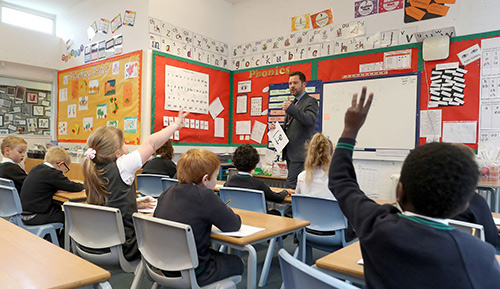Teacher strikes expected in February and March

The UK faces further disruption as thousands of teachers are set to strike in February and March.
The National Education Union chiefs are due to announce results of a ballot for industrial action today, Monday 16 January at 17:00 GMT - despite NASUWT failing to meet the threshold for action.
The National Association of Headteachers (NAHT) is also expected to reveal whether their members have secured enough votes to strike.
The NEU has said walkouts in England and Wales could begin at the end of the month after more than 300,000 teachers and support staff were asked to vote in a dispute over pay. The union will have to give two weeks' notice of any industrial action. If it goes ahead most schools would be affected.
Last week, a ballot of members of the NASUWT teachers union failed to reach the 50% turnout threshold, the turnout was 42%, although nine in 10 of those who did vote backed strikes.
For strike action to be legal, at least 50% of eligible members must vote in a strike ballot, with 40% of all eligible members approving the action.
Sunday’s Mirror stated joint general secretary Mary Bousted said: “I'm confident, based on our own internal surveys of our membership, that we will reach the ballot threshold.”
“But the only vote that counts is that reported by the independent polling company and we'll know that just before we make the announcement to the members tomorrow afternoon.”
“So, whilst looking at internal data, I feel confident that we will make thresholds, we have not had that confirmed yet. But we will do that tomorrow.”
She admitted industrial action would take its toll on youngsters - whose schooling has already been hampered by lockdowns during the coronavirus pandemic - and parents who would need to arrange childcare.
“Unfortunately, there is an impact upon children and parents and we really don't want that to happen, and we wouldn't be taking this action if there was any alternative, but at the moment we don't see there is,” she told Times Radio.
A return to online lessons and covid-style classes
Emergency plans which could be triggered if teachers strike could include a return to online classes for pupils, with lessons taken by non-striking teachers.

Headteachers could also merge classes or arrange other activities for affected kids.
Ministers also hope schools will join together to share resources, raising the prospect of pupils being transported to different premises for their lessons.
But Ms Bousted hoped strikes could still be avoided - if the Government came up with a better offer that reflected the cost-of-living crisis with inflation running at 10.7%.
Most state-school teachers in England and Wales had a 5% pay rise in 2022, but NEU members want a pay rise of 12%.
Talks between union leaders and Education Secretary Gillian Keegan are due to take place in the coming days.
Ms Bousted said: “We've got two weeks and we'll stop whatever we're doing, we'll get into the Department of Education and we'll negotiate, of course we will.
“Our members don't want to take strike action - they have been driven to it by government neglect to the education service, and by so many teachers walking away from the profession.”
Last month, Ms Keegan told LBC listeners she hoped teachers wouldn’t vote to strike, but understood they have a right.
“People don’t die in school. But they don’t get educated either.”
Paul Whiteman, general secretary of the NAHT, told the Observer that heads and teachers would expect their unions to keep fighting.
“I think it’s fair to say that just because a technical threshold hasn’t been met, the disputes don’t go away,” he said. “Members will still be expecting their union to find a solution with the employer. If a sensible solution isn’t reached, there’s always the possibility that members will vote in a second ballot, with those thresholds being met. If there is any relief the government might be feeling, they should think again.”
Whiteman warned that the erosion of pay over a decade was now putting huge pressure on teaching staff’s vocational drive, with “heartbroken” teaching assistants now regularly being offered major pay increases to move into retail jobs.
“We’ve got this stupid situation at the moment in which highly skilled, very well-trained teaching assistants can garner more money working in a supermarket than they can looking after vulnerable children. Headteachers tell me that teaching assistants or support staff often bring them their resignation letter in tears. They have to leave the job they love and the children they love to support and are heavily invested in, because they can’t make ends meet. And supermarkets are able to pay them significantly more.”
“At the moment there are huge numbers of children who don’t have a subject specialist teaching them. We don’t have enough maths teachers, we don’t have enough physics teachers, and we are finding it difficult to replace headteachers.
“The same crisis that you see in health is happening in education. The reason it isn’t so apparent or so dramatic is because people don’t die in school. But they don’t get educated either. If we don’t invest in that education, it has a very long-term impact on our country’s ability to be a major player on the world stage.”
The Government hit out at the strike plans.
The Department for Education pointed out to the fact that the NASUWT failed to secure enough votes to approve strike action said: “After two years of disrupted education for children and young people, families will be relieved that these teachers did not choose to strike.”
“The education secretary has arranged further meetings with union leaders to avoid harmful strike action.”
“We have already met the unions’ request for a further £2 billion for schools both next year and the year after in the Autumn Statement and awarded teachers with the highest pay award in 30 years.”

16 days of strike action for Scotland
Today, members of the Educational Institute of Scotland union begin 16 days of rolling strike action, with teachers in two of Scotland's 32 local authority areas walking out each day until 6 February. Scottish teachers already walked out for two days last week after no new pay offer was received disrupting most primary and secondary schools, including preliminary exams which had to be rescheduled for secondary pupils.






